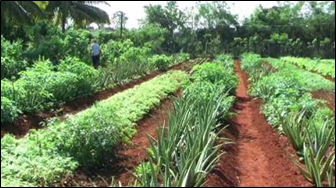
FRIDAY, JAN 27, 2023: NOTE TO FILE

Module 3-28
Bioregional and sustainable food systems
5.10. BioRegional Approach to Sustainable Food Systems – The Cuban Experience
In certain parts of the world where communities have been challenged to feed themselves, there are some magnificent examples of urban agriculture and community gardening saving the citizens from starvation. In Cuba, shortly after the break-up of the Soviet Union (1990), famine threatened when their supply of artificial fertilisers and chemical pesticides dried up. Luckily, they were introduced to Permaculture and threw themselves whole-heartedly into food growing on every spare square metre of urban ground. As a result, Cuba has more urban agriculture than any other national territory and it is organic too (Source: Permaculture Magazine).

Figure 5.10: Cuban example of "Organoponico" food garden

Cuba also introduced new legislation to boost the organic food security movement, namely: (1) to promote urban agriculture within a 5km radius around towns and cities; (2) to transfer parcels of rural land, from 1 to 5 ha, to small scale farmers; and, (3) to transfer ownership of large state agricultural co-operatives to local farmers. For participants particularly interested in this theme, the documentary film, “The Power of Community: How Cuba Survived Peak Oil”, illustrates the magnificent community spirit involved in the organic transformation of Cuban agriculture. This Cuban example is perhaps the first BioRegional, large-scale and island-wide, approach for a sustainable food system.
The concept of BioRegionalism is based on diversity and environmental stewardship of specific geographic regions, which Kirkpatrick Sale defines as, “It is any part of the earth's surface whose rough boundaries are determined by natural characteristics rather than human dictates, distinguishable from other areas by particular attributes of flora, fauna, water, climate, soils, and landforms, and by the human settlements and cultures those attributes have given rise to." (Source: Sale, K., “Dwellers in the Land: The Bioregional Vision”, University of Georgia Press, 1991/2001). Furthermore, Sale’s book review by University of Georgia Press, provides a fitting vision for a BioRegional Sustainable Food System as:
“Imagine a world structured around ecological and cultural diversity, rather than national and political parameters. In response to present and impending ecological and economic crises, Kirkpatrick Sale offers a definitive introduction to the unique concept of bioregionalism, an alternative way of organizing society to create smaller scale, more ecologically sound, individually responsive communities with renewable economies and cultures. He emphasizes, among many other factors, the concept of regionalism through natural population division, settlement near and stewardship of watershed areas, and the importance of communal ownership of and responsibility for the land. Dwellers in the Land focuses on the realistic development of these bioregionally focused communities and the places where they are established to create a society that is both ecologically sustainable and satisfying to its inhabitants”
Module 3, lesson 29
